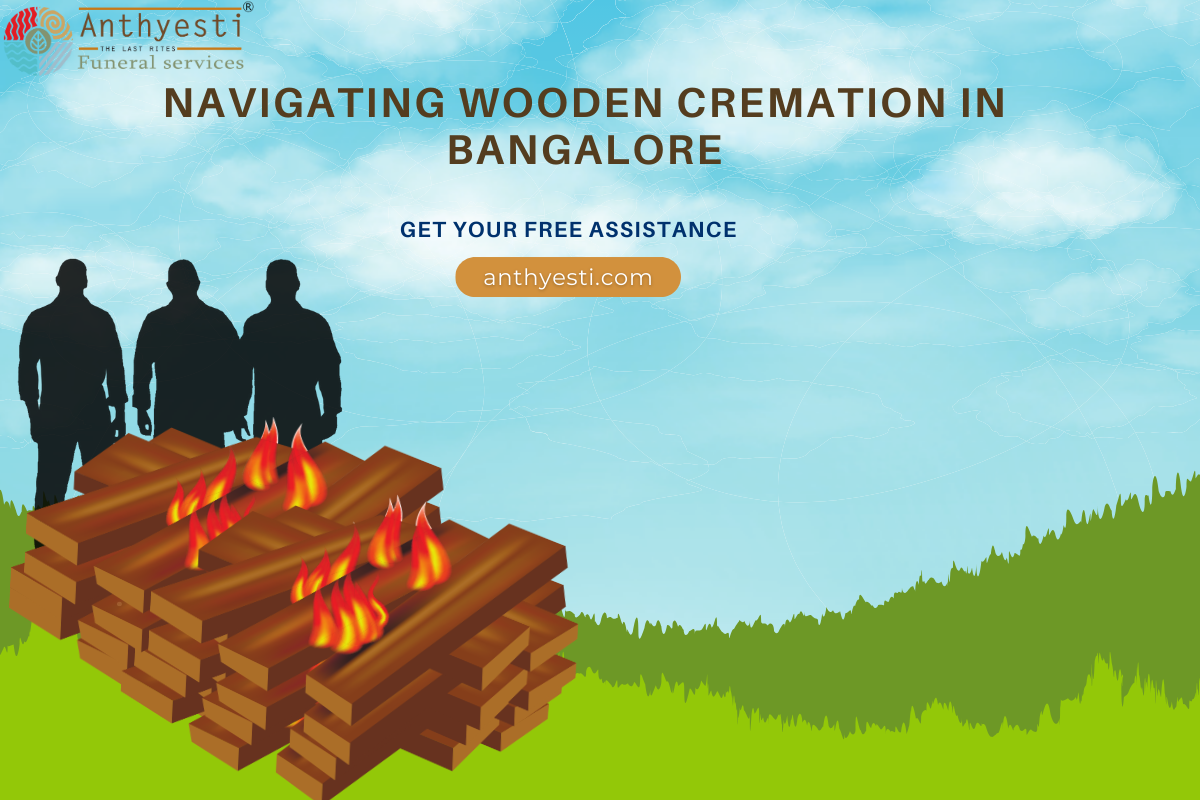Navigating Wooden Cremation in Bangalore: A Detailed Guide to Rituals and Grounds
Wooden cremation remains a revered tradition in Indian culture, symbolizing the liberation of the soul and the fulfillment of religious rites. In a city like Bangalore, balancing traditional customs with the logistics of arranging a cremation can seem daunting, particularly in moments of grief. This guide provides essential insights into cremation grounds, rituals, and frequently asked questions to help families navigate the process smoothly.
Overview of Wooden Cremation
Wooden cremation, a traditional Hindu practice, involves cremating the deceased on a wood pyre. This process is symbolic of purifying the soul and facilitating its journey to the afterlife. Unlike electric cremation, it holds deep cultural significance, with rituals varying across communities.
In Bangalore, wooden cremation is a commonly chosen option, supported by several dedicated cremation grounds. To perform a wooden cremation, families must understand the procedural, legal, and ritualistic aspects involved.
Cremation Grounds Offering Wooden Cremation in Bangalore
Bangalore has several cremation grounds equipped for wooden cremations. Below are some notable locations:
- Kalpalli Crematorium: Located near Old Madras Road, this is a historical cremation ground offering facilities for traditional wooden cremation and ample space for rituals.
- Banashankari Crematorium: Situated in South Bangalore, this well-maintained facility caters to traditional cremation requirements.
- Hulimavu Crematorium: Near Bannerghatta Road, this serene location offers a peaceful environment for wooden cremation services.
- Hebbal Crematorium: Located in North Bangalore, this facility supports both wooden and electric cremations.
- Chamarajpet Crematorium: Centrally located, it is easily accessible and ideal for traditional cremation ceremonies.
Steps to Organize a Wooden Cremation
1. Secure a Death Certificate: The cremation process begins with obtaining a death certificate from the hospital or municipal authorities.
2. Contact a Cremation Ground: Once the certificate is ready, families should book a cremation slot. Confirming the availability of wooden cremation facilities beforehand is crucial.
3. Gather Required Materials:
Materials essential for wooden cremation include:
- Firewood (often sandalwood or mango wood)
- Ghee (clarified butter) to fuel the pyre
- Camphor and incense
- A white cloth to wrap the deceased
- Flowers and garlands
4. Conduct Pre-Cremation Rituals:
Hindu customs include:
- Preparation of the Body: The deceased is bathed, dressed in fresh clothes, and adorned with flowers.
- Prayers and Blessings: Priests perform rituals and chant mantras to purify and sanctify the body.
5. Perform the Cremation:
The chief mourner, usually the eldest son or a close family member, lights the pyre. Priests guide the family through prayers and rituals during the cremation.
6. Carry Out Post-Cremation Rituals:
- Ashes are collected after cremation, typically for immersion in a sacred river. Families in Bangalore often travel to the Ganges or use local rivers for this purpose.
Key Rituals in Wooden Cremation
- Mukha Agni (Lighting the Pyre): The main mourner performs this act, symbolizing the release of the soul from earthly bonds.
- Pinda Daan: Offering rice balls (pindas) ensures nourishment for the soul in its spiritual journey.
- Tarpan (Water Offering): This involves offering water to honor and appease the deceased.
- Shraadh Ceremony: Performed after 10 to 13 days, it includes prayers and offerings to Brahmins to commemorate the departed.
Why Opt for Anthyesti Funeral Services?
At Anthyesti Funeral Services, we aim to alleviate the burden of arranging a wooden cremation by providing end-to-end support. Our offerings include:
- Assistance in obtaining necessary documentation
- Coordination with cremation grounds
- Procurement of materials for rituals
- Guidance from experienced priests
- Transportation of the deceased
We are committed to ensuring that each step is handled with dignity and professionalism, allowing families to focus on their emotional well-being.
Conclusion:
Wooden cremation is a meaningful tradition that honors the departed while observing deeply spiritual rituals. By understanding the process, selecting a suitable cremation ground, and engaging professional services, families can ensure the final journey is conducted with grace and respect.
At Anthyesti Funeral Services, we are here to guide you through every step of this sacred journey, making the process less overwhelming during your time of loss. Reach out to us for support and to learn more about our services in Bangalore.
FAQ’s:
1. What documents are required for wooden cremation?
A death certificate is mandatory. In certain cases, identification proof and a no-objection certificate may be needed.
2. How long does the cremation process take?
Wooden cremations typically take 3–4 hours, depending on the wood and pyre size.
3. Can rituals be customized for specific communities?
Yes, rituals can be adapted to align with community traditions. Communicating requirements in advance is recommended.
4. Who performs the last rites in Hindu tradition?
Traditionally, the eldest son performs the rites, but any close family member can be chosen.
5. Are post-cremation rituals necessary?
While optional, rituals like Shraadh and Tarpan are deeply rooted in Hindu tradition and believed to bring peace to the departed soul.
Call us at +91 87925 63332

